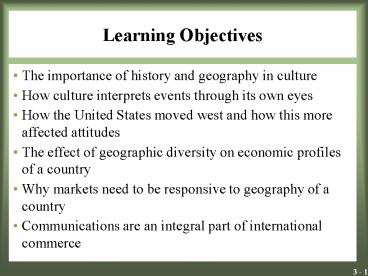Learning Objectives - PowerPoint PPT Presentation
1 / 14
Title: Learning Objectives
1
Learning Objectives
- The importance of history and geography in
culture - How culture interprets events through its own
eyes - How the United States moved west and how this
more affected attitudes - The effect of geographic diversity on economic
profiles of a country - Why markets need to be responsive to geography of
a country - Communications are an integral part of
international commerce
2
Global Perspective
- To fully understand a societys actions and its
points of view, you must have an appreciation for
the influence of historical events and the
geographical uniqueness to which a culture has
had to adapt. - To interpret a cultures behavior and attitudes,
a marketer must have some idea of a countrys
history and geography.
Culture is defined as a societys accepted basis
for responding to external and internal events.
3
History is Subjective
- Historical events always are viewed from ones
own biases and SRC. - A crucial element in understanding any nations
business and political culture is the subjective
perception of its history.
4
Manifest Destiny and the Monroe Doctrine
- Both accepted as the basis for U.S. foreign
policy during much of the 19th and 20th
centuries. - The idea of Manifest Destiny was used to justify
U.S. annexation of Texas, Oregon, New Mexico, and
California and later, U.S. involvement in Cuba,
Alaska, Hawaii, and the Philippines. - Three basic dicta of the Monroe Doctrine
- No further European colonization in the New World
- Abstention of the U.S. from European political
affairs - Nonintervention of European governments in the
governments of the Western Hemisphere
5
Geography and Global Markets
- Understanding of how a societys culture and
economy are affected as a nation struggles to
supply its peoples needs within the limits
imposed by its physical makeup. - Climate and Topography
- Altitude, humidity, and temperature extremes
- South America
- British resistance of the English Channel
- Trade through the Alps
6
Geography, Nature and Economic Growth
- As countries prosper, natural barriers are
overcome. - Environmental issues
- Disruption of ecosystems
- Relocation of people
- Inadequate hazardous waste management
- Industrial pollution
7
Social Responsibility and Environmental Management
- Environmental protection is not an optional extra
- Pollution is on the verge of getting completely
out of control - China has 16 of the worlds 20 most polluted
cities - Critical issue the disposal of hazardous waste
- Sustainable development
8
World Energy Consumption
- Insert Exhibit 3.3
9
Dynamics of Population Trends
- Controlling population growth
- A main deterrent to population control is
cultural attitudes about the importance of large
families. - Rural/urban migration
- Result of a desire for greater access to
education, health care, and improved job
opportunities. - Population decline and aging
- Population growth in many countries has dropped
below the rate necessary to maintain present
levels. - Not one major country has sufficient internal
population growth to maintain itself.
10
World Population by Region, 2005-2050, and Life
Expectancy at Birth, 2005-2010 (millions)
- Insert Exhibit 3.4
11
Rural and Urban Population, 2005-2030 (millions)
- Insert Exhibit 3.5
12
Dynamics of Population Trends (continued)
- Worker Shortage and Immigration
- The free flow of immigration will help to
ameliorate the dual problems of explosive
population expansion in less-developed countries
and worker shortage in industrialized regions. - Europe will need 1.4 billion immigrants over the
next 50 years. - Japan and the U.S. will need 600 million
immigrants between now and 2050.
13
500 Years of Trade
- Insert Exhibit 3.7
14
Summary
- An international marketer should be reasonably
familiar with the world, its climate, and
topographic differences. - Geographic hurdles must be recognized as having a
direct effect on marketing, communications and
distribution. - Without an historical understanding of a culture,
the attitudes within the marketplace may not be
understood. - The study of history and geography provides the
marketer with an understanding of why a country
has developed as it has.































